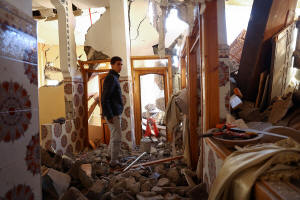Morocco quake survivors struggle in shelters, with some villages yet to
receive help
 Send a link to a friend
Send a link to a friend
 [September 12, 2023]
By Ahmed Eljechtimi, Alexander Cornwell and Jihed
Abidellaoui [September 12, 2023]
By Ahmed Eljechtimi, Alexander Cornwell and Jihed
Abidellaoui
AMIZMIZ, Morocco (Reuters) -Many survivors of Morocco's most powerful
earthquake in over a century were struggling in makeshift shelters on
Tuesday after a fourth night outside, with rescuers yet to reach remote
mountain villages which suffered some of the worst devastation.
The death toll from the 6.8 magnitude quake that struck in the High
Atlas Mountains late on Friday stood at 2,862, with 2,562 people
injured, but those figures looked likely to rise.
Rescuers from Spain, Britain and Qatar were helping Morocco's search
teams, while Italy, Belgium, France and Germany had all offered to send
in specialists but said they had yet to receive the green light from the
Moroccan government.
Hopes of finding survivors under the rubble were fading with the passage
of time, not least because many of the traditional mud brick houses that
are common in the mountain villages crumbled to earthen rubble without
leaving air pockets.
Along the Tizi níTest road that passes through some of the most remote
areas, survivors were critical of the rescue efforts by the government,
which they accused of failing the most devastated hamlets.
"The problem is that the authorities are focusing on the bigger
communities and not the remote villages that are worst affected," said
Hamid Ait Bouyali, 40, who had spent the night along the road on the
outskirts of Rakte.

Some villages had yet to receive any help because roads were blocked by
landfalls.
In Amizmiz, a large village at the foot of the mountains that has turned
into an aid hub, some people made homeless by the quake had been
provided with yellow tents by the authorities, but others were still
sheltering under blankets.
"I am so scared. What will we do if it rains?" said Noureddine Bo
Ikerouane, a carpenter, who was camping with his wife, mother-in-law and
two sons, one of whom is autistic, in an improvised tent fashioned from
blankets.
AID OFFERS NOT ACCEPTED
Omar Aneflous, a tailor, said even those whose homes were still standing
were too scared to return because of the risk of collapse.
"Probably we will stay here for months or a year. People won't go home
because their homes risk falling. God knows how long we will stay here,"
he said.
[to top of second column]
|

Mouath Aytnasr, 20, who lost his 7-year-old brother Suleiman in the
earthquake, walks on the rubble of his damaged house, in a hamlet on
the outskirts of Talat N'Yaaqoub, in the aftermath of Morocco's
deadliest earthquake September 11, 2023. REUTERS/Hannah McKay

The only cafe open in the area was packed with people desperate for
coffee and comfort, despite gaping cracks and holes in the wall and
piles of debris on the floor.
"The boss asked us to work because everything is closed and people
need coffee to wake up," said waiter Kamal Ansis.
The epicenter of the quake was about 72 km (45 miles) southwest of
Marrakech, where some historical buildings in the old city, a UNESCO
World Heritage Site, were damaged. The quake also caused major
damage to the historically significant 12th-century Tinmel Mosque.
More modern parts of Marrakech largely escaped unscathed, including
a site near the airport earmarked for IMF and World Bank meetings,
due to be held next month.
Over 10,000 people are expected at the meetings, which the
government wants to go ahead, sources said.
Morocco has accepted offers of aid from Spain and Britain, which
both sent search-and-rescue specialists with sniffer dogs, and from
the United Arab Emirates and Qatar. Algeria said it had allocated
three planes to transport rescue personnel and aid.
State TV said the Moroccan government might accept relief offers
from other countries later.
Italy and Belgium joined France and Germany in saying they had
offered to send in rescue teams but were still waiting for requests
from Morocco.
Germany said it did not think the decision was political, but
Italian Foreign Minister Antonio Taji told radio station Rtl that
Morocco had chosen to receive aid only from countries with which it
had close relations.
(Additional reporting by Zakia Abdennebi, Giselda Vagnoni and
Charlotte Van Campenhout; Writing by Estelle Shirbon)
[© 2023 Thomson Reuters. All rights
reserved.]This material may not be published,
broadcast, rewritten or redistributed.
Thompson Reuters is solely responsible for this content.
 |